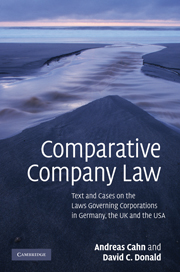 Comparative Company Law
Comparative Company Law Book contents
- Frontmatter
- Contents
- List of figures
- List of tables
- Preface and acknowledgments
- Glossary
- List of abbreviations
- Table of cases
- Table of legislation
- PART I The essential qualities of the corporation
- PART II The corporation and its capital
- PART III Governing the corporation
- SUBPART A The management
- 10 An introduction to the board and its governance
- 11 Directors' power to represent the company
- 12 Directors' duties of loyalty, good faith and care
- 13 Judicial review of management decisions (the business judgment rule)
- 14 Executive compensation
- 15 Directors' duties in listed companies
- SUBPART B The members
- PART IV Corporate combinations, groups and takeovers
- References
- Index
15 - Directors' duties in listed companies
from SUBPART A - The management
- Frontmatter
- Contents
- List of figures
- List of tables
- Preface and acknowledgments
- Glossary
- List of abbreviations
- Table of cases
- Table of legislation
- PART I The essential qualities of the corporation
- PART II The corporation and its capital
- PART III Governing the corporation
- SUBPART A The management
- 10 An introduction to the board and its governance
- 11 Directors' power to represent the company
- 12 Directors' duties of loyalty, good faith and care
- 13 Judicial review of management decisions (the business judgment rule)
- 14 Executive compensation
- 15 Directors' duties in listed companies
- SUBPART B The members
- PART IV Corporate combinations, groups and takeovers
- References
- Index
Summary
Required reading
Directors' transactions with the company
D:Kodex, paras. 4, 5
UK: FSA Listing Rules, Rule 11
US: Securities Exchange Act of 1934, § 13(k); Regulation S-K, Items 402–404
Composition of the board: audit committees and independent directors
D:Kodex, para. 5.3.2
UK: Combined Code, A.3, D.2–D.3
US: Exchange Act, §§ 3(a)(58) and 10A(m); SEC Release on “Standards Relating to Listed Company Audit Committees,” pp. 18790–18796
Directors' dealings in the company's securities
D: WpHG, § 15a
UK: FSA Listing Rules, Rule 9, Annex, 4–11
US: Exchange Act, § 16
Prohibiting insider dealing
EU: Market Abuse Directive
D: WpHG, §§ 12–14, 21–29
UK: FSA Disclosure and Transparency Rules, Rule 2; Criminal Justice Act 1993, secs. 52–64
US: Exchange Act, §§ 10(b), 14(e); Rules 10b-5, 10b5-1, 14e-3
Why regulation changes for listed companies
What it means to “list” on a securities exchange
When a company places its securities for sale on an organized market, this is often referred to as an “initial public offering” (IPO), but the term is incomplete. An IPO is a public offering of the company's stock, but a listing on a securities exchange is a separate matter. The two go together because a primary offering of shares to the public is made much more attractive by the availability of a secondary market for those shares. One purpose of a securities exchange is to provide such a secondary market.
- Type
- Chapter
- Information
- Comparative Company LawText and Cases on the Laws Governing Corporations in Germany, the UK and the USA, pp. 442 - 464Publisher: Cambridge University PressPrint publication year: 2010


